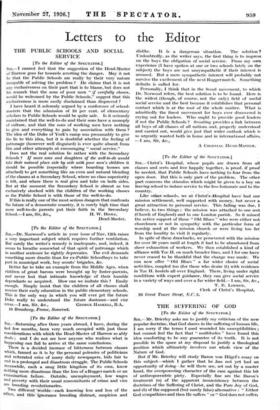Letters to the Editor
THE PUBLIC -SCHOOLS AND SOCIAL SERVICE [To the Editor of the SPECTATOR.]
cannot feel that the suggestion of the Head-Master
of Harrow goes far towards averting the danger. May it not be that the Public Schools are really by their very nature incapable of solving the problem ? He claims that it is not any exclusiveness on their part that is to blame, but does not his remark that the sons of poor men " if carefully chosen,
would be welcomed by the Public Schools," suggest that this exclusiveness is more easily disclaimed than disproved ?
I have heard it solemnly argued by a conference of school- masters that the admission of 10 per cent. of elementary scholars to Public Schools would be quite safe. Is it seriously maintained that the well-to-do and their sons have a monoply of culture, and that the sons of working men have nothing to give and everything to gain by association with them ? The idea of the Duke of York's camp was presumably to give the lie to this idea, but it is doubtful whether the feeling of patronage (however well disguised) is ever quite absent from this and other attempts at encouraging " social service."
Does not the real solution lie rather with the Secondary Schools ? If more sons and daughters of the well-to-do would take their natural place side by side with poor men's children it should be possible (especially where boarding houses are attached) to get something like an even and natural blending of the classes at a Secondary School, where no class superiority is felt, and where there is real give and take on both sides. But at the moment the Secondary School is almost as too exclusively stocked with the children of the working classes as the Public School is with those of the well-to-do.
If this is really one of the most serious dangers that confronts the future of a democratic country, it is surely high time that more well-to-do parents put their faith in the Secondary Head-Master.


















































 Previous page
Previous page